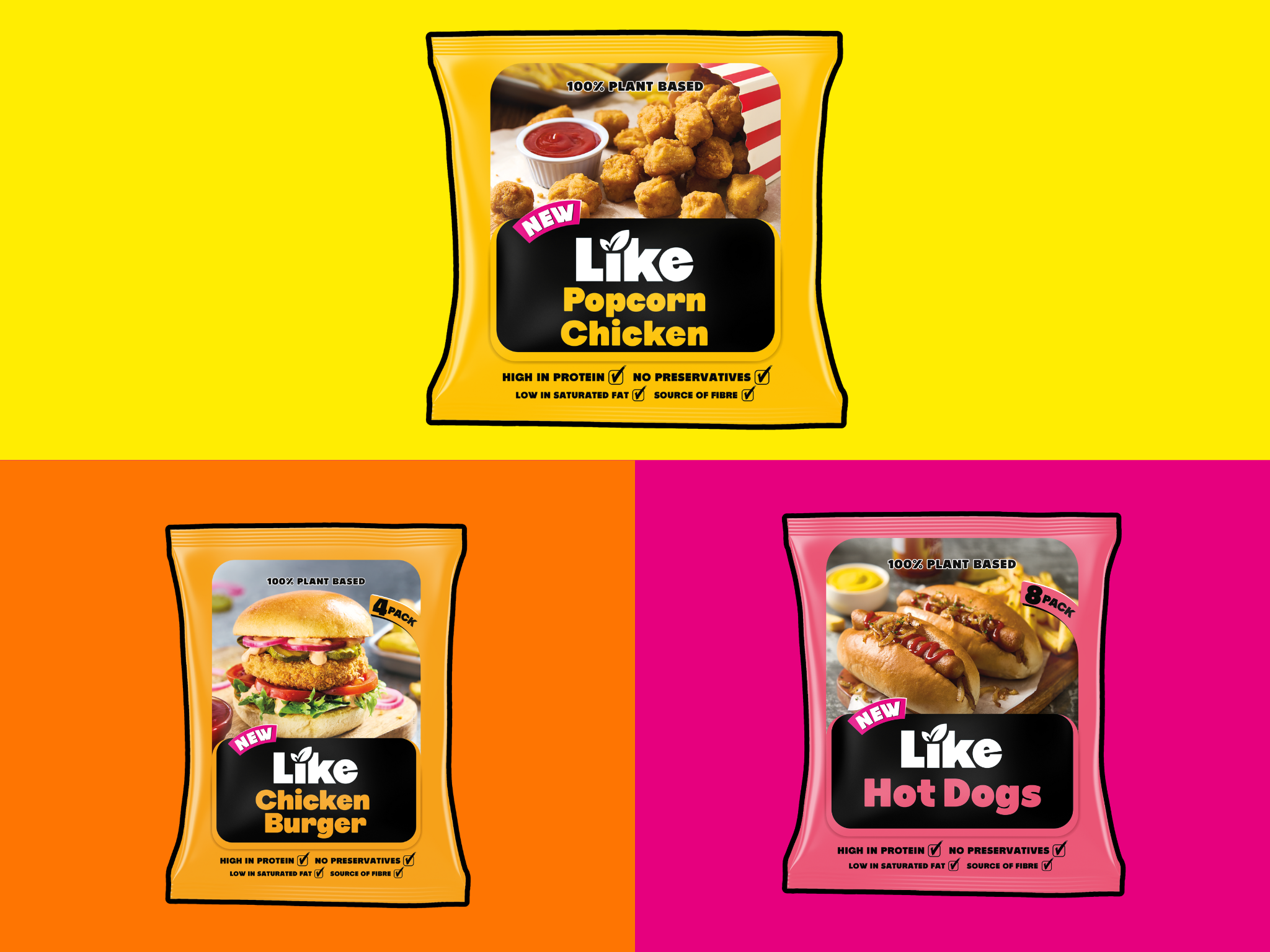
Like, the plant protein brand owned by Livekindly Collective, is returning to UK shelves with three SKUs across all major supermarkets.
Livekindly Collective is bringing back its Like brand of plant-based meat to the UK, around three years after it quietly exited the market.
The German brand’s vegan chicken nuggets, popcorn chicken, and hot dogs will debut at Tesco on September 8, followed by a wider rollout at Sainsbury’s, Morrisons, Asda and Iceland.
Its products were previously available in the UK, through retailers including Tesco and Iceland, but had been discontinued around 2022. While there was no official explanation, the move was likely due to post-Brexit import and shipping costs.
Now, Like is targeting young Brits who are looking to reduce their meat intake, but will face challenges in a market that has altered significantly since it was last there.
High in protein, low in saturated fat

Like was co-founded in 2013 by Robert Haub and Timo Recker (the latter went on to co-found fellow plant protein startup Tindle Foods). The firm was acquired by Livekindly Collective, a roll-up company owned by investment firm Blue Horizon, in 2020.
According to the company, it is the second-largest plant-based food brand in Germany. With products also available in the Nordics, the Netherlands, and the US, it is now moving to the second-largest market for vegan food in Europe.
Like offers frozen products that can be cooked and eaten on their own as snacks, but also work as ingredients in protein bowls, salads, pastas and wraps. All the SKUs are priced at £2.75.
The hot dogs are made from wheat gluten, textured soy protein, soy protein isolate and sunflower oil, alongside starches, seasonings, and methylcellulose. Each 360g pack contains eight links, which have 7g of protein and 4.5g of fat (with only 0.6g of saturated fat).
The chicken burger also contains textured soy protein and wheat gluten, alongside more than 30 other ingredients. Each 80g patty has 9.6g of protein, 4.7g of fibre, and 3.2g of fat (of which only 0.3g is saturated). They come in 320g packs of four.
Finally, the nuggets also have a rather long ingredient list, and comprise textured soy protein, textured soy protein concentrate, soy protein isolate, and sunflower oil. They come in 300g packs, with 11g of protein, 4.5g of fibre and 9g of fat (1.2g saturated) per 100g.
“Like recipes are HFSS-compliant, high in protein, low in saturated fat and a source of fibre. With sustainability KPIs, the retailers also welcomed the news that all Like packaging is fully recyclable,” said Emma Herring, Livekindly Collective’s UK marketing manager.
Like takes on UK’s conflicted appetite for plant-based meat

Moving into the UK market in 2025 brings about both opportunities and obstacles for plant-based meat producers. Meat purchases fell by 13% between 2018-19 and 2022-23, leading some to suggest that the country has reached “peak meat”. But it’s unclear whether this is a temporary response to the cost-of-living crisis or the beginning of a longer-term trend.
And while 47% of Brits believe eating less meat and dairy would help reduce climate harm, only 27% are consuming fewer animal proteins to benefit the planet. Similarly, despite three in five consumers being willing to cut back on meat, the share of those who eat it at least five times a week rose from 43% in 2022 to 50% in 2024.
Sales of meat alternatives, meanwhile, fell by 7% last year, as Brits opted for traditional plant proteins like tofu and beans, leading even meat alternative makers to develop whole-food options. At the same time, 9% of Brits are either vegan, vegetarian or pescatarian, and another 31% identify as flexitarians. And half of them want to further change their diets by either eating less meat and dairy (33%) and/or more plant-based foods (38%).
“Gen Z flexitarians are an important consumer segment in the meat-free category, and with its bold, impactful look, feel and appetite appeal, combined with our exciting marketing plans, [the] Like brand is well placed to engage this audience,” argued Herring.
But Like’s appeal to younger generations may prove to be tricky, especially when it comes to Gen Z men. In the UK, men aged 16-24 are twice as likely to have increased their annual meat intake as men of all other ages, and 17% of young men feel uncomfortable eating plant-based food in public (versus 11% of all men).
In fact, this demographic has the lowest percentage of people who have reduced their meat intake in the last year (16%) and the highest of those who have been eating more (19%), according to the Food Foundation.
However, Like’s frozen-only approach could pay off. The freezer accounts for 57% of plant-based meat volume sales in the UK, where it is 40% cheaper per kg than the fridge. “We believe we have found a sweet spot in this category, ticking taste and health credentials, two key drivers for attracting a younger audience, but at a more accessible price point than other taste-led brands in the category,” said Herring.
The LiveKindly Collective-owned brand will hope that these enable it to compete with established breaded vegan chicken players like Quorn, Bird’s Eye, Moving Mountains, and VFC, as well as hot dog alternative makers like Fry’s Family Foods.
The post German Plant-Based Meat Like Returns to the UK with Eye on ‘Gen Z Flexitarians’ appeared first on Green Queen.
This post was originally published on Green Queen.